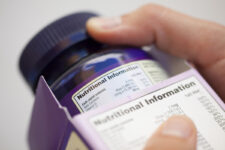There are thousands of mushroom species, some of which are known to have medicinal properties. These are known as functional mushrooms, which have been used for centuries worldwide as food and therapeutics.
More and more studies have recently tested these historical and cultural uses of functional mushrooms. Evidence points to functional mushrooms offering possible benefits for immune health, cognitive function, and even cancer treatment (1).
You may be wondering about the effects of functional mushrooms and if they are safe to eat. Learn more below about the different types of functional mushrooms along with their health benefits and risks.

What are Functional Mushrooms?
Functional mushrooms, also known as adaptogenic or medicinal mushrooms, contain biologically active compounds that have numerous health benefits and disease-fighting qualities (1). They have been used for centuries for medicinal purposes but have recently grown in popularity in Western culture.
Some people confuse functional mushrooms with hallucinogenic mushrooms. Functional mushrooms are different from psychedelic mushrooms because they do not contain psilocybin, the compound in psychedelic mushrooms that causes hallucinogenic effects (2).
Functional mushrooms can be found in many products, from coffee to supplements to gummies.
Some types of functional mushrooms can be tasty to eat, such as shiitake mushrooms. However, most functional mushrooms have a bitter taste and are often consumed in supplement form via powders, extracts, capsules, or even beverages.
The health benefits of functional mushrooms have been studied more in recent years, but human research on this topic is still in its early stages. Promising benefits such as tumor-fighting qualities, antioxidant content, immune-boosting power, and cognitive function enhancements make functional mushrooms an exciting subject for future research (1).
Types of Functional Mushrooms
Different types of functional mushrooms are known for their varying health benefits. Below is a list of the best functional mushrooms for improving health.
1. Lion’s mane
Lion’s mane is an edible functional mushroom used in traditional Chinese medicine to treat many ailments (3). Its fuzzy and droopy appearance makes it look like an actual lion’s mane.
It is consumed in culinary and supplement forms and, interestingly, has a flavor similar to seafood. Lion’s mane is thought to have benefits for improving Alzheimer’s disease, cancer, and immune health (3, 4).
2. Cordyceps
Cordyceps is a functional mushroom that has been used in traditional Chinese medicine for hundreds of years. It is a common soup ingredient in South China, but it’s generally consumed in supplement form in Western cultures.
This mushroom is typically touted to improve athletic performance and lower blood cholesterol levels (5, 6).
3. Turkey tail
These functional mushrooms contain colorful rings that resemble a turkey’s fanned-out feathers. Due to their chewy texture, turkey tail mushrooms are not typically consumed as food but rather in a tea or supplement form.
Turkey tail mushrooms are packed with antioxidants and polyphenols, making them known for their immune health benefits (7).
4. Shiitake
Shiitake mushrooms are perhaps the most familiar functional mushroom, easily accessible at grocery stores and used in culinary and medicinal applications. These mushrooms are thought to have antiviral, anti-inflammatory, and anticancer health benefits (8).
5. Chaga
Chaga is a type of functional mushroom traditionally used in Northern Europe for medicinal purposes and is commonly consumed as a tea. It’s been studied for its possible benefits in treating inflammation, diabetes, cancer, and heart disease.
However, like other functional mushrooms, human studies are lacking (9).
6. Reishi
Reishi is a functional mushroom used for treating numerous conditions in alternative medicine. It is very bitter and doesn’t typically have culinary uses.
Its supplement form is touted for possible immune health and cancer-fighting benefits, though these have not been proven (10).
Health Benefits of Functional Mushrooms
There are numerous purported health benefits of functional mushrooms. These are suspected to be due to the potent biologically active compounds that functional mushrooms contain.
Beta-Glucan Source
Beta-glucans are polysaccharides found in functional mushrooms and are thought to contribute to their health benefits. Beta-glucans are a source of soluble fiber known to help improve digestive and immune health (11, 12).
Antioxidant Source
Functional mushrooms are well known for their rich antioxidant properties. Antioxidants are compounds that help fight free radicals that damage our cells.
A diet rich in antioxidants can help protect against inflammatory diseases, such as cancer, heart disease, and cognitive decline (13, 14).
Cognitive Function
There are many claims that functional mushrooms can improve cognitive function, serve as a natural energy boost, and treat anxiety.
There is preliminary evidence that functional mushrooms can improve mild cognitive impairment (15). Studies have also shown functional mushrooms to be a possible future component of treatment for Alzheimer’s disease (16).
Some evidence suggests that functional mushrooms can improve fatigue and anxiety, making functional mushroom coffee blends popular (17).
Anti-Cancer Properties
Growing evidence suggests functional mushrooms may have cancer-fighting properties. The concept of “cancer fungotherapy” involves using functional mushrooms with other therapies to shrink cancerous tumors.
These drugs are still being tested in clinical trials and are a promising future treatment option (18).
Side effects of Functional Mushrooms
While functional mushrooms have great appeal due to their proposed benefits, they’re not without risk. Many people tolerate the supplements well, but possible side effects include upset stomach, dizziness, dry mouth, or itching.
Functional mushroom supplements can also interact with the action of certain medications, including blood thinners, diabetes medications, and blood pressure medications (19). It’s important to discuss any new supplement with your doctor to make sure it’s the right fit for you.
There’s very little safety data on functional mushroom supplements in pregnancy and breastfeeding, so it’s generally recommended that these populations avoid taking them.
Lastly, be aware of supplement quality if you choose to take functional mushrooms. Optimal doses have yet to be established due to the research on functional mushrooms being in the early stages.
Supplements are not well regulated, so you aren’t guaranteed to get what is advertised or that the health claims being made are accurate. Look for third-party quality testing certifications which will appear on the label as GMP, NSF, CL, or USP.






